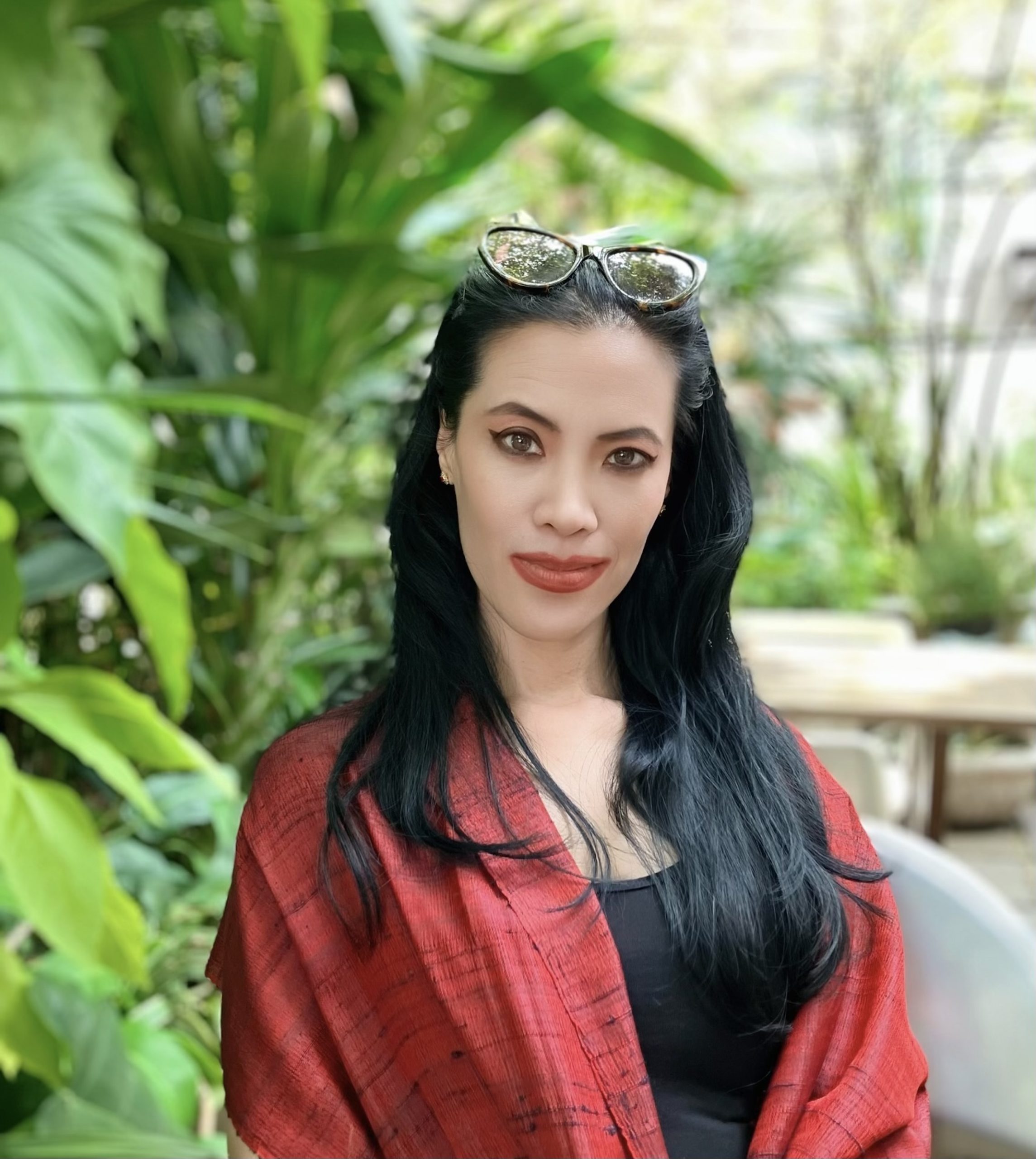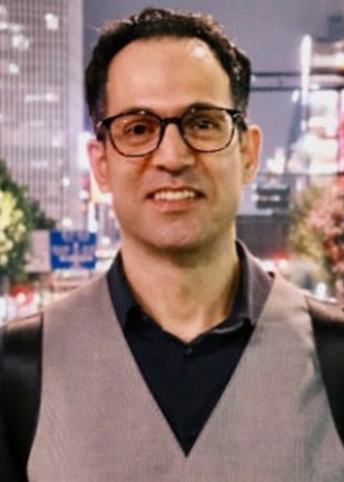📢 Pre-Conference Workshops Now Open for Registration!
We are excited to announce that the MICOLLAC 2025 Pre-Conference Workshops will be held online and are now open for registration! These workshops provide a valuable opportunity for participants to engage with experts, explore key themes, and enhance their knowledge and skills in areas related to language, communication, and literature, ALL… before the main conference begins!
🗓️ All Pre-Conference Workshops will be conducted between June and July 2025, offering flexibility and convenience for participants to join from anywhere.
Pre-Conference Speakers

Ms. Pauline Fan
Biodata
Pauline Fan is a writer, literary translator, and cultural curator from Kuala Lumpur, Malaysia. Her translation of An Ordinary Tale about Women and Other Stories by renowned Malay writer Fatimah Busu was published by Penguin Random House SEA in her translation of poems by Sarawak poet Kulleh Grasi, Tell Me, Kenyalang (Circumference Books, 2019), was shortlisted in the United States for the National Translation Award in Poetry, the first for a Southeast Asian author and translator, and longlisted for the Best Translated Book Awards in 2020. Pauline was recently
shortlisted for the inaugural PEN Presents x International Booker Prize grant for her on-going translation of Ruhaini Matdarin’s novel, Hari-Hari Terakhir di Jesselton (The Last Days of Jesselton).
In Other Words: A Workshop on Literary Translation
This workshop with writer and literary translator Pauline Fan invites participants into the intricate, creative process of literary translation. Blending reflection with practice, the session will explore how a translator navigates meaning, rhythm, imagery, and
cultural nuance across languages. Pauline will share insights into her own translation journey, offering concrete examples from her work with three distinct voices: the bold, subversive prose of Malay writer Fatimah Busu; the multilingual, oral-rooted poetry of
Sarawakian poet Kulleh Grasi; and the elliptical lyricism of German-language poet Paul Celan. Participants will be encouraged to consider how language shapes thought and feeling, and how translation becomes an act of both interpretation and re-creation. This two-hour workshop will also include hands-on translation exercises, giving participants the opportunity to experiment with their own translations and
engage in group discussions about the challenges and creative possibilities of this art. This session is ideal for students, scholars, writers, translators, and readers intrigued by the resonances between languages.
12th June 2025, 11 AM – 1 PM (MYT) 

Dr. Teh Hui Lin
Biodata
Teh Hui Lin is currently teaching English academic writing courses at Sunway University with 11 years of experience in the teaching and curriculum design in academic writing courses. Her research areas of interest include genre analysis, academic writing and corpus-based research in language analysis.
Enriching encounter: Corpus-based Study with Antconc
This workshop will focus on a hands-on application of how to use Antconc, a concordance tool, for a corpus-based study in linguistic analysis. The demonstration will be based on a PhD study conducted by the speaker. A brief overview of the research procedures would be provided to explain the steps to conduct the analysis of the data. The speaker would also share relevant resources that are deemed pertinent to the corpus-based study, with a specific focus on linguistic analysis in academic writing.
17th June 2025, 2 PM – 3 PM (MYT) 

Dr Lee Sze Seau
Biodata
Dr Lee Sze Seau (李 施晓) or Dr Jill has been teaching and supervising non-native speakers of English at the higher education level since 2008. Dr Jill has guided her undergraduate and postgraduate students in publishing SCOPUS-indexed articles which can be viewed at https://www.scopus.com/authid/detail.uri?authorId=57202848761
Reading Effectively and Critically for Literature Review
A well-defined research problem must be grounded in a comprehensive and critical review of existing literature. Despite the availability of artificial intelligence tools such as ChatGPT and Jenni, many novice researchers continue to struggle with effectively and critically engaging with both seminal and recent literature. Research and supervisory experience highlight the challenges students face in synthesizing and connecting ideas from the literature, particularly when they are non-native English speakers. This session introduces participants to a three-step reading strategy that has successfully helped undergraduate and postgraduate students in linguistics and education read academic literature more effectively and critically. When applied consistently and correctly, this strategy can support students and novice researchers in producing high-quality scientific publications. By attending this session, participants will gain a practical and adaptable approach to overcoming the challenges of reading for research.
17th June 2025, 3 PM – 4 PM (MYT) 

Mr Chua Kok Yee
Biodata
Chua Kok Yee is a Malaysian author whose work spans short fiction, novels, and graphic narratives. His stories have been featured in major Malaysian anthologies such as KL Noir: Blue, Ronggeng-ronggeng: Malaysian Short Stories, Remang, and The Best of Malaysian Short Fiction in English 2010–2020. He is the author of the short story collection Without Anchovies (2010), the award-winning novel Not A Monster (2022), and his most recent work, the graphic novel Bleeding Scars: The Calamity of Canning (2024). Chua is an adjunct professor at the Department of English, Faculty of Modern Languages and Communication, Universiti Putra Malaysia, where he teaches Creative Writing in the Master of World Literature programme.
Pitch, Persuade & Perform: Storytelling for a Successful Career
This talk explores how storytelling can be essential to professional success. Whether you’re joining the corporate world, climbing its ladder, switching industries, or building a personal brand, the ability to communicate your value through stories is a game-changer. This session breaks storytelling into three parts: how to pitch your personal and professional narrative; how to persuade through emotionally engaging and logical storytelling; and how to perform with confidence through storytelling. With practical advice and real-world examples, this talk will provide you with the mindset and skillset to stand out, connect with others, and lead with impact in your career. In a world full of noise, the best story wins.
18th June 2025, 2 PM – 3 PM (MYT) 

Prof. Dr. Sarjit Singh Gill
Biodata
Dr. Sarjit Singh Gill is a Professor of Social Anthropology at UPM, specializing in minority studies, particularly the Sikh community in Malaysia. He has contributed to national policies, international conferences, and media discussions on societal issues. He co-edited Emerging Dynamics in Contemporary India-Malaysia Relations (2023).
Thesis Writing Journey for Social Science Research
The viva examination is a crucial component of the academic assessment process, where students defend their research and demonstrate their understanding of their field of study. This talk aims to discuss the key goals of a viva, highlight examiner expectations, and provide insights into effective preparation. One primary goal of the viva is to assess the student’s ability to articulate their research clearly, critically engage with their work, and justify their methodologies, findings, and conclusions. Examiners expect students to have a comprehensive understanding of their research area, including relevant concepts, theories, and methodologies. Common mistakes made by students during vivas often include inadequate responses to critical questions, a lack of clarity in explaining key concepts, and an inability to defend methodological choices effectively. To prepare, students should thoroughly review their thesis, focus on areas that may be questioned, and practice explaining their research concisely. Common questions asked by examiners typically involve justifications for research design, interpretations of findings, and discussions of theoretical and methodological approaches. By understanding these expectations and preparing accordingly, students can increase their chances of success in the viva. This talk aims to equip students with the necessary tools to approach their viva confidently, ensuring they can defend their research effectively and demonstrate a strong understanding of their academic field.
24th July 2025, 10 AM – 11 AM (MYT)

Assoc. Prof. Jinzhu Zhang
Biodata
Jinzhu Zhang currently works as an associate professor at Yunnan University of Finance and Economics. In 2008, she got her master degree in Applied Linguistics at Yunnan Normal University, China. She has been pursuing PhD degree in English Language at Universiti Putra Malaysia, Malaysia since 2020. Her academic interests include Academic Writing and Second Language Acquisition.
Navigating the Maze: A Personal Journey Through Developing a Systematic Literature Review
This preconference workshop introduces the PRISMA 2020 paradigm for conducting systematic literature review (SLR), emphasizing its role in advancing evidence-based research through transparency, adaptability, and rigorous methodology. Attendees will follow a structured presentation that outlines the full SLR lifecycle, from formulating research questions and designing multi-database search strategies to applying structured screening protocols and synthesizing data using PRISMA 2020’s updated guidelines. The workshop highlights PRISMA 2020’s key enhancements, such as expanded support for scoping reviews, dynamic evidence synthesis, and standardized reporting for complex analyses. Throughout the presentation, the presenter’s experience of adopting the paradigm will be shared to illustrate strategies for addressing common challenges such as the problem of lack of transparency, incomplete or selective reporting. Specifically, PRISMA 2020 framework not only provides a standardized framework that clearly outlines each step but also addresses issues related to, ensuring comprehensive and consistent reporting of the review from question formulation to result presentation. Participants will be directed to the official PRISMA 2020 website for access to checklists, templates, and additional resources to support their SLR implementation. By the end of the workshop, attendees will possess foundational knowledge of the PRISMA 2020 paradigm and actionable insights to conduct high-quality, transparent SLR that inform evidence-informed decision making and advance scholarly inquiry.
24th July 2025, 11 AM – 12 PM (MYT)

Assoc. Prof. Dr. Vahid Aryadoust
Biodata
Vahid Aryadoust is an Associate Professor of Language Assessment at the National Institute of Education, Nanyang Technological University, Singapore. He has received multiple awards and currently holds positions as Honorary Associate Professor at the Institute of Education, UCL, London, and Visiting Professor at Xi’an Jiaotong University, China. His research interests include generative AI in language assessment, meta-analysis, and sensor-based technologies such as eye tracking, brain imaging, and galvanic skin response (GSR). Dr. Aryadoust has published widely in leading journals such as Language Testing, Computer Assisted Language Learning, Applied Linguistics, System, etc. and authored multiple books and chapters with publishers like Cambridge University Press and Routledge. An advocate for accessible education, he created the award-winning YouTube channel “Statistics and Theory,” earning the John Cheung Social Media Award in 2020.
Revisiting Reliability in Second Language Research Through a Critical Lens
This talk critically revisits the concept of reliability in second language (L2) research, a foundational yet often misunderstood construct in the field. Reliability is typically viewed as a technical concern focused on consistency and replicability, though some scholars have even expanded its scope to include broader considerations of research credibility and interpretive rigor beyond statistical procedures in validation research. The discussion unpacks various dimensions of reliability, including internal reliability—commonly associated with internal consistency measures—and external reliability, which encompasses replicability, rater reliability and agreement. The talk also addresses persistent confusion around these categories and the tendency to conflate reliability with related concepts, particularly validity. Drawing on contemporary methodological critiques, I highlight the need for a more theoretically grounded understanding of reliability, one that considers epistemological assumptions, methodological choices, and the target language use domains in which L2 is used. I also discuss a relatively recent meta-analytical approach known as “reliability generalization,” which my co-authors and I have applied in our synthetic research in recent years. Participants will be encouraged to reconsider how reliability is conceptualized and reported in their own work, and to reflect on its implications for research design, data interpretation, and knowledge construction in L2 research.
28th July 2025, TBC
Whether you’re registering for the full conference or are only interested in the workshops, we have affordable packages to suit your needs. Please refer to the details below to select your preferred option and complete the payment/registration process.
| You may refer to the fee here: https://micollac.upm.edu.my/registration/ 1) Pay 2) Under the “Details” tab, please indicate: – Participant’s name – Email address – Contact number – State” Conference+ Pre-conference Workshops” 3) Register here  | |
| Participants who are attending only the pre-conference workshops do not need to register. 1) Make the payment (RM60) 2) Under the “Details” tab, please indicate: – Participant’s name – Email address – Contact number – State” Pre-conference Workshops only” 3) Pay here  |
